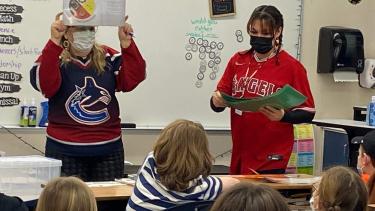
National Indigenous Peoples Day & Truth and Reconciliation as Process
Today is National Indigenous People’s Day in Canada. Established in 1996 June 21st is a day for all Canadians to recognize and celebrate the unique heritage, diverse cultures and outstanding contributions of First Nations, Inuit and Métis peoples.
I would like to share some of the work that our learning community has done together to celebrate Indigenous Peoples and contribute towards Truth and Reconciliation.
Last September, elementary schools across our district participated in a professional development day focused on Indigenous Education. The keynote speaker for the event was Kevin Lamoreaux, who spoke on the importance of Truth and Reconciliation. As he ended his keynote address, he said [regarding Truth and Reconciliation] “Be okay with non-closure but not inaction.” This phrase served as an impetus for our learning community to reflect on how we can contribute towards Truth and Reconciliation.
Our staff examined our Local Enhancement Agreement for Indigenous Students. A local Enhancement Agreement for Indigenous Students is an agreement set between the Abbotsford School District, the Ministry of Education and the local Indigenous community. Staff members read components of the agreement and summarized what they had read with others. Our next step was to determine what action(s) we would commit to between September and December. Our kindergarten teacher, Tarrie Smith, suggested that we revision our House Teams to have an Indigenous focus. This was an idea that resonated with other staff and as a learning community we used this idea as our compass for action. Partnering with our Indigenous Support Worker, Nadine Kitchekeesik, with support from an Indigenous Support Worker mentor, Chris Kelly, we have embarked on a journey as we look to create a new set of house teams incorporating indigenous ways of learning and being.
We involved our students in this process of revisioning our house teams using a book called, The Seven Sacred Teachings, for inspiration. From the seven animals in this book, our students and staff voted and chose our new house teams: eagle, wolf, buffalo, and bear. Once our animals were selected we created an artwork contest for Indigenous students across our district to participate in. We received several submissions from students, and Zeda Ellis, a student at Abbotsford Virtual School, designs were selected to form our new house teams. Later this month we will recognize them at our year end awards ceremony and unveil the artwork designs which will form the new house teams.
Students who see themselves reflected in a school culture and community and feel more connected to it. Learning about other cultures and indigenous education has been a focus for our school, and one our learning community has embraced. Our secretary, Kimberly Juulsen, and I read a Halq’eméylem word of the week over the announcements each day. One of our Indigenous students offered these words, “I feel like I can learn so much more this year with the Halq’eméylem word of the week, it gives me a chance to learn a new word every week. I like to go home and write them down so I can remember and practice. It gives me courage to keep learning about the Halq’eméylem word of the week.” Today, as a school we will play Halq’eméylem Bingo with the words of the week our students and learning community have been learning throughout this year.
Our Library Learning Commons (LLC) technician, Tambra Henderson, helped us complete an equity and diversity scan of our library collection, and enhance our collection of books in our school library. In addition, the Indigenous Education Department LLC technician, Loraleigh Epp, provided us with a list of Indigenous books they recommend for school collections. These tiny actions, and intentions have the power to unite a community. Throughout this journey this has taught me the importance of embracing process, and that Truth and Reconciliation is a process, not a destination, and that each of us play an integral role in this journey.
One of our Assistant Superintendents, Carla Danielsson, has said that “working in a school is like coming to a potluck, we each have unique skills and talents that we bring to our roles.” For our school communities to thrive, as leaders we must recognize the unique talents of our staff and provide opportunities to cultivate them as we work together as an education system to embrace truth and reconciliation as a process.
Galen Soon
Acting Principal
Bradner Elementary School